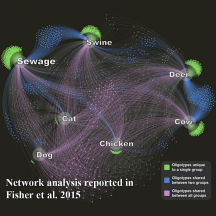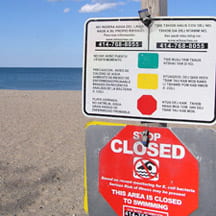Our lab focuses on understanding the links between environmental processes and human health. Microbes underpin many of these processes and are key agents in human health and disease. We explore human and animal microbiome community structure to identify new indicators of waterborne disease threats, and investigate what the distribution of these organisms can tell us about urban impacts on freshwater resources. We also examine the urban water microbiome to understand how bacteria survive and adapt in new environments. Our research is important to devise management strategies, inform water policy, and ultimately solve pollution problems and protect human health.
NEW! Postdoc position available in bacterial genomics and environmental microbiology, come join the lab!
See details in lab news
 COVID-19 SURVEILLANCE
COVID-19 SURVEILLANCE
With our expertise in sampling, evaluating, and understanding microbial communities in raw sewage, we are working towards setting up a state wide effort using sewage as a surveillance tool for the COVID-19 pandemic. We are part of a broad network of laboratories across the country that are developing methods to detect SARS-CoV-2 in sewage. In addition to the technical aspects of this project, we are collaborating with experts in communication and public health to develop tools and frameworks for communicating wastewater-based epidemiology data to public health departments across the country.
 Alternative Indicators
Alternative Indicators
We are taking an entirely new approach for pathogen surveillance by using next generation sequencing technologies to characterize the complex microbiomes of humans and animals and develop new water quality indicators that provide information as to the source of pollution.
 Climate, Health and the coastal environment
Climate, Health and the coastal environment
Our lab is quantifying agricultural runoff and sewage pollution impacts on estuaries and the Great Lakes. We have found that stormwater has a human pollution signal from failing sewers, an unrecognized but serious source of pathogens, antibiotics and pharmaceuticals to waterways. This research examines the links between climate, extreme events, and human health risks in the nearshore.
 Beaches
Beaches
Elevated E. coli levels are the cause of beach closings around the Great Lakes. Our research focuses on understanding the genomic basis and adaptive traits of E. coli that can survive and even grow in the sand, which severely confounds monitoring efforts since many agencies still use this organism as a water quality indicator at beaches.
 Urban Water Microbiome
Urban Water Microbiome
Urban microbial ecology is an emerging field that will impact how we build our cities and maintain clean water. We have found that the urban sewer infrastructure contains a highly abundant resident microbial community. Members of this pipe community are likely excellent models to understand basic questions of how microbes adapt to new environments created by human activity.
